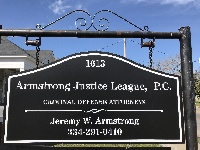Fort Mitchell DUI-DWI Lawyer, Alabama
Jeremy W. Armstrong
✓ VERIFIEDCriminal, Felony, Misdemeanor, DUI-DWI, State Appellate Practice
"A Criminal & D.U.I. Defense Law Firm"
I have spent my entire legal career in the criminal justice system as a former prosecutor and a criminal defense attorney since October 2000. In Apri... (more)
Will O. Walton
✓ VERIFIEDAccident & Injury, Criminal, DUI-DWI, Trucking, Wrongful Death
After many years of practicing law with a large prestigious firm, Trip Walton decided to build his own firm around a core of attorneys with superior t... (more)
Mark Francis Penaskovic
Car Accident, Litigation, DUI-DWI, Employment Discrimination
Status: In Good Standing
Brandon M Daniels
Divorce, Divorce & Family Law, DUI-DWI, Criminal
Status: In Good Standing Licensed: 17 Years
Walter Mark Northcutt
Criminal, Estate, DUI-DWI, Wills & Probate
Status: In Good Standing Licensed: 38 Years
Joseph L. Dean
DUI-DWI, Criminal, Personal Injury, Car Accident
Status: In Good Standing Licensed: 48 Years
William Lamar Smith
Estate, DUI-DWI, Criminal, Accident & Injury
Status: In Good Standing Licensed: 32 Years
FREE CONSULTATION
CONTACT


